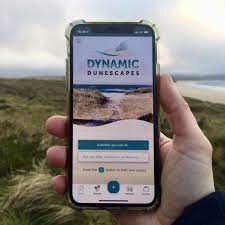By identifying and recording plant species, you can help scientists and conservationists protect and restore biodiverse sand dune habitats in England and Wales, using this app.
With a beautiful range of habitats, coastal sand dunes are home to some amazing wildlife – including butterflies, lizards, toads and orchids. As a citizen scientist, you’ll help researchers gather vital sand dune habitat and species data to help strengthen the understanding of what’s going on in coastal sand dune environments, and to help improve the conservation work that is being done.
From monitoring species to taking part in transect or quadrat surveys, explore the range of citizen science activities in the app which you can get involved in, and share your findings in the app when you next visit your chosen sand dune site. The Dynamic Dunescapes Citizen Science App helps make monitoring sand dune habitats easier. Environmental monitoring is an essential part of any conservation project. We want to know the health and distribution of the species that we're trying to support, and we need to know whether our actions are helping. So, we've created a free, easy-to-use smartphone app to help us gather reliable, long-term data at our project sites.
The app is for Dynamic Dunescapes site managers, reserve staff, and trained volunteers to conduct monitoring activities and record data whilst out on Dynamic Dunescapes sites. If you are a volunteer or citizen scientist with Dynamic Dunescapes, speak to your site manager about getting involved and using the app.
If you're not yet a volunteer, but would like to help us manage our sand dunes, you can register your interest by filling out a short form on our volunteering page, and a member of your local team will get back to you. Dynamic Dunescapes is a partnership project supported by the National Lottery Heritage Fund and the EU LIFE Programme. Project partners are Natural England, Plantlife, Natural Resources Wales, National Trust and the Wildlife Trusts.
